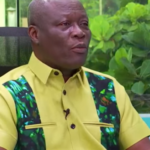Ghana is likely to go back to the International Monetary Fund (IMF) says Economist at the University of Cape Coast Department of Economics, Dr William Godfred Cantah.
Dr Godfred Cantah projected that given the country’s current debt-to-Gross Domestic Product (GDP) status and increasing decline in revenue mobilization, it is likely to happen by the end of 2021 or early 2022.
“Currently if you look at the way our debt to GDP is going, and for the fact that for the past three years we have had a continuous reduction in revenue mobilization, then there is that possibility that we will have no choice than to go back to the IMF,” he said in an interview during an event organized by Economic Governance Platform at the Coconut Grove Regency Hotel in Accra.
The event with the support from OXFAM-Ghana was under the theme “Assessment of the Ghanaian Economy 2012 – 2020” brought together Civil Society Organizations, the Australia Embassy in Ghana, Non-Governmental Organizations, and the media for the discussion.
Dr. Godfred Cantah says government will definitely have to go the IMF unless the government increases its revenue mobilization and closes up the revenue gap.
“Until we do that, we will have no other choice than to go the IMF,” he said.
To avoid going to the IMF, the Economist suggested “closing up the tax leakages that exist in the economy, and then roping in more people into the tax net and getting the informal sector to pay tax, these are the things we need to consider doing.”
Touching on the issue of graduate unemployment, Dr. Catanh stated that until the government invests in a sector that has the capacity to employ them, the problem of graduate unemployment will continue to persist.
“We will continue having the situation of graduate unemployment until we start supporting our SME’s to expand to absolve them.”
“Another key issue has to do with the continued production of managers rather than producers. Our tertiary institution produces more people from the humanities than the sciences, so you end up producing people who cannot produce anything but hope that somebody produces for them to manage.”
“And so far as you don’t have people who can produce for you to manage, then you will end up not getting people employed. So until we tackle it from the root, it will continue to be a challenge in this country,” he posited.
The Economist also disclosed that one of the easiest ways to get the country formalized is by helping the SMEs to grow big.
“If they grow, they have no choice than to undertake a number of things that these big companies do,” Dr Catanh added.
Source:Norvanreport














